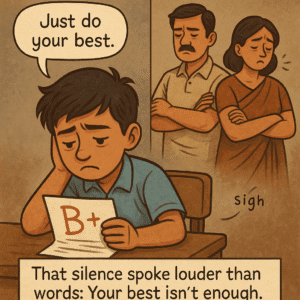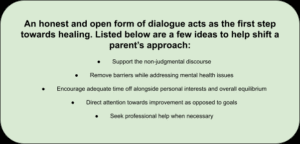 The Unseen Battle Behind Report Cards
The Unseen Battle Behind Report Cards
“Have report cards become so important to us as modern parents that we are willing to set them aside as we watch our children suffer just because we want to see an A+ on a report card?” There’s a story behind each one of your child’s glowing report cards that you will probably never get to hear, a story that involves countless sleepless nights, terrified mornings, and a quiet voice inside your child’s head whispering, “Don’t let them down, don’t let them down.” In a society that often measures worth with grades, countless students live with the heavy burden of parental expectations. What to many parents feels like love or motivation can start to feel, to the children, like nothing so much as a steady pressure that undermines their sense of self. The emotional cost is rarely visible, but it is profound and much longer-lasting than the result of any test.
As an example:-
Every Night, Aarav was buried in books, not because he loved learning, but in dread of letting the people down who had once uttered the phrase, “We just want the best for you.”
Their silence was more thunderous than their words — arms folded across chests, eyes bulging with pressure, not pride.
He wasn’t chasing dreams. He was fleeing from failure.
And all in a room full of accomplishments, he had never felt more invisible.
While no one stopped to ask, “Are you okay?” —only “Did you trip?”
This article reveals the mental health crisis concealed behind academic success and illustrates why
it’s time to reexamine the way we determine success.
💔 Love or Leverage? When Support Turns into Pressure
Parents play an important role in every child’s success. But when their support is limited to your results and performance, it turns into leverage. “When parents say, ‘We don’t expect anything—just do your best,’ but quietly hope for an A+, it sends a different message to the child: ‘Your best isn’t enough unless it’s perfect.’ And that quiet pressure can weigh heavier than words ever could.”
Key Insight: Students begin linking self-esteem to report cards.
Even subtle pressure- The incessant prods to learn, the insidious comparisons, the disillusioned
sighs over a grade of B — they might appear insignificant, but to a kid, they can be like silent emotional pressure.
With time, children start feeling as if love is no longer freely given.
It begins to seem like something they have to work for — one stellar mark at a time.
 💬Aarav’s Silent Struggle
💬Aarav’s Silent Struggle
Aarav’s parents never shouted.
They simply said, “Just do your best.”
But when a B+ appeared on his report card, they sighed… and walked away.
No anger. Just quiet disappointment.
That silence spoke louder than words:
“Your best isn’t enough.”
So Aarav studied harder. Smiled more. Cried less.
Because somewhere along the way, he stopped believing he was loved for who
he was—
and started believing he was only loved for how well he performed.
🏆 The Trophy Child Syndrome: Perfection or Performance?
In today’s achievement-obsessed world, children are no longer chasing their dreams—they’re carrying the weight of their parents’ pride and reputation. Somewhere along the way, they’ve forgotten that they, too, are allowed to have flaws, fears, and dreams that don’t fit neatly on a report card. From topping exams to winning medals, all triumph becomes a slick post, a humblebrag, a moment designed to impress the world more than it encourages the child.
✅Key Insight: The child becomes the product, not the person.

Everyone wants to celebrate success and the child on the medal stand, with an A+ on social media — but when a B+ comes across the transom, the phone goes silent. No applause. No empathy. Because in truth, it is a silent note, only success deserves the spotlight. A medal winner’s photo is followed by #ProudParent — and we rarely hear a story to go with that smile. Was it exhilaration or merely relief that they did not disappoint?
Over time, these kids aren’t working toward something for the love of it — they’re doing it for the
applause.
“They stop asking themselves, ‘What do I like? What are my dreams?’ Now, their question becomes:
‘What do I need to do to make my parents happy?'”
And when perfection is the cost of love, failure begins to resemble rejection.
Behind every trophy, there might be a child quietly asking, “Am I enough if I don’t win next time?”
😔 Mental Illness Hidden Behind Medals
Perversely, it’s the kids who appear to be the most “together”—straight A’s, glowing recommendations, shelves lined with achievement medals—who often are most unraveling on the inside. For the photos, they smile, but behind closed doors, they fight anxiety, insomnia, panic attacks, and a profound sense of unworthiness.
✅Key Insight: Good grades don’t guarantee good mental health.
Because they “look fine,” their pain is written off. Teachers think they’re managing. Parents think they’re flourishing. Friends think they have nothing to complain about. But secretly, many of them feel like phony imposters—scared that one mistake will destroy the perfect picture everyone has in mind. And so they remain silent. Because to ask for help would be to appear vulnerable. Because falling
short, even emotionally, is to betray.
What we are celebrating as an achievement may, in fact, be only survival.
🧠 Silent Signals: What Children Wish They Could Say
Children don’t always say, “Your pressure is destroying me.” Instead, they say, “I’m fine.” They retreat, lose interest in activities they used to enjoy, or complain of headaches and fatigue.
✅Key Insight: Silence doesn’t mean safety—it could mean suffering. Children frequently stuff their feelings so as not to bother those they care about. This silent war grows over the years into either emotional stupor or emotional outbursts. They’re stuck in a loop
in which just admitting they are in pain feels like losing. When they say, “I’m fine,” they may mean, “I’m scared,” “I’m overwhelmed,” or just, “Please notice me.” As a society, we should no longer confuse silence with peace, and we should start to listen for unspoken cries for help. Because silence is rarely as safe as it appears.
🌿 From Pressure to Peace: Real Solutions That Work
Enough of the quiet suffering. Enough of the “we just want what’s best for you” and passing down suffocating expectations. Healing doesn’t start with a medal—it starts with a pause, a conversation, and the bravery to opt for connection rather than control.
💬Parents, ask yourselves—do you know your child or just their grades?
Instead of emphasizing the need to micromanage every check or change, make a safe zone in which your child can talk, whether what they say scares you or not. Make mental health.
Conversations at the dinner table are as normal as talking about what you want to do with your career. Promote rest without guilt and hobbies without payoff, and effort without pressure. You see, love is never supposed to be a scoreboard.
✅Key Insight: A student who feels emotionally safe is far more likely to succeed, not just in school, but in self-worth, resilience, and life.
And what of schools?
The frantic race to the top must now give way to an old paradigm of “ranks” = value.” This backward belief system needs to be thrown in the dumpster. Children are not products, and students are not commodities. They are people. Counselors who are trained in trauma-informed care should consider vulnerabilities as strengths and must offer mental health days. A+’s are not meant for book-smart people only.
Acceptance, Awareness, and Authentic Support is the real A+.
Aren’t we looking to raise children who are more than simply “successful,” but rather, complete?
 🤝 Parenting Redefined: From Authority to Ally
🤝 Parenting Redefined: From Authority to Ally
In an outcome-hungry world, children are quietly yearning for connection.
They don’t want you to be perfect—they want you to be present. Swap the question “What did you score?” with the question “How are you really feeling?”
Because when love is conditional, learning is fearful.
✅Key Insight: Emotional safety isn’t a luxury—it’s the foundation of real achievement. Celebrate efforts, not grades. Listen without judgment. Make home the safest place to fail, grow, and try again. Because a child who is seen and supported isn’t just more confident—they’re unstoppable.
Culture, Shame & Silence: Why We Don’t Talk About This Enough
In numerous families, particularly in Asian, African, and South American cultures, educational success is not simply viewed as an individual triumph but rather a culmination of a family’s heritage. The academic performance of a student serves as a report card for the student’s parents, signifying their upbringing, societal esteem, and even valuation as caregivers. In this regard, a mental dip or struggle doesn’t receive any care or attention, only scrutiny to ensure no damage is being done to the reputation.
Instead of hearing,
🔹“What’s hurting you?”
🔹They hear, “What will people say?”
Rather than support, they get silence.
Rather than being validated, they are shamed.
And gradually, an impaired child learns to hide. To suppress. To shrink.
Before they ever forget one day that they no longer recognize the voice they’ve mastered behind
the performance.
✅Key Insight: Cultural silence doesn’t protect families—it suffocates their children. We must stop romanticizing stress and glorifying overwork as signs of strength. The “silent sufferer” isn’t noble—it’s a tragedy in disguise.
Pressure is not proof of love. Shame is not a strategy. Silence is not safety.
Let’s replace “log kya kahenge?” with “tum kaise ho?”
Let’s raise a generation that values healing as much as achievement.
🎓 Conclusion: Redefining Success in a Broken System
No, success isn’t straight A’s — it’s waking up knowing each morning is not a day filled with dread, truly knowing you are loved without any prerequisites, and understanding that your worth isn’t tied to a grade. Most report cards __ that radiate have behind them silent struggles, hidden fears, and invisible hurt. The pressure coming from parents, however well-intentioned, hurts what it aims to build. It’s time to choose compassion over pride, connection over control. Good has become children who are not merely high achievers but humans. The world doesn’t need better kids.
They require calm ones.

